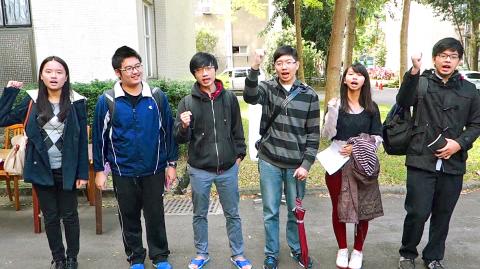Students who participated in a so-called “expert consultation meeting” yesterday to review issues surrounding controversial history curriculum changes unanimously withdrew from the meeting venue in protest of what they said was the Ministry of Education’s attempt to downplay the controversy.
The meeting, held at the Affiliated Senior High School of National Taiwan Normal University in Taipei, was arranged at the order of the Executive Yuan in compliance with an agreement reached among lawmakers during cross-caucus negotiations in early August in the wake of student-led protests against what they called China-centric history curriculum guidelines.
The meeting was attended by six students, who unanimously withdrew from the scene shortly after proceedings began.

Photo: Wu Po-hsuen, Taipei Times
Chia Nan University of Pharmacy and Science student Yu Teng-chieh (游騰傑) said the ministry delayed publishing the minutes taken during previous meetings to design and review the curriculum guidelines.
The ministry’s reluctance to improve data transparency shows that it is insincere about resolving the controversy surrounding the guidelines and is “waiting for the issue to blow over,” Yu said.
Protesters demanded that the ministry publish a roster of experts it contracted to address issues regarding the history guidelines.
Since the controversy erupted in July, the ministry has only disclosed the names of curriculum guidelines development committee members, who were responsible for compiling the guidelines, while information on academics involved in alterations and approval of guidelines are still unavailable.
In response, the ministry said the experts have reached a consensuses on seven of the 17 controversies surrounding the guidelines.
Draft proposals on how to better adjust and compile history curriculum guidelines and how to improve the review process are to be completed by March next year, the ministry said, adding that a roster of experts enlisted for the consultation meetings would be published shortly.
Democratic Progressive Party Legislator Cheng Li-chun’s (鄭麗君) office director, Yu Yi-jan (游毅然), said the ministry had asked academics on a task force to review curriculum guidelines and the curriculum approval committee whether they would like to be identified and most of them declined.
Yu Yi-jan said that the task force and the committee are held responsible by critics for the controversial guidelines, adding that academics in these two units probably did not want to be identified out of concern that it would provoke reproach.
Cheng, sitting on the legislature’s Education and Culture Committee, has criticized the consultation meeting and said that it contravenes the Executive Yuan order.
As all resolutions made during expert consultation meetings must be forwarded to the approval committee, which has the right to decide whether to defer, the arrangement of such meetings does not help to improve an opaque decisionmaking process at all, she said.

US climber Alex Honnold is to attempt to scale Taipei 101 without a rope and harness in a live Netflix special on Jan. 24, the streaming platform announced on Wednesday. Accounting for the time difference, the two-hour broadcast of Honnold’s climb, called Skyscraper Live, is to air on Jan. 23 in the US, Netflix said in a statement. Honnold, 40, was the first person ever to free solo climb the 900m El Capitan rock formation in Yosemite National Park — a feat that was recorded and later made into the 2018 documentary film Free Solo. Netflix previewed Skyscraper Live in October, after videos

NUMBERS IMBALANCE: More than 4 million Taiwanese have visited China this year, while only about half a million Chinese have visited here Beijing has yet to respond to Taiwan’s requests for negotiation over matters related to the recovery of cross-strait tourism, the Tourism Administration said yesterday. Taiwan’s tourism authority issued the statement after Chinese-language daily the China Times reported yesterday that the government’s policy of banning group tours to China does not stop Taiwanese from visiting the country. As of October, more than 4.2 million had traveled to China this year, exceeding last year. Beijing estimated the number of Taiwanese tourists in China could reach 4.5 million this year. By contrast, only 500,000 Chinese tourists are expected in Taiwan, the report said. The report

Temperatures are forecast to drop steadily as a continental cold air mass moves across Taiwan, with some areas also likely to see heavy rainfall, the Central Weather Administration (CWA) said. From today through early tomorrow, a cold air mass would keep temperatures low across central and northern Taiwan, and the eastern half of Taiwan proper, with isolated brief showers forecast along Keelung’s north coast, Taipei and New Taipei City’s mountainous areas and eastern Taiwan, it said. Lows of 11°C to 15°C are forecast in central and northern Taiwan, Yilan County, and the outlying Kinmen and Lienchiang (Matsu) counties, and 14°C to 17°C

STEERING FAILURE: The first boat of its class is experiencing teething issues as it readies for acceptance by the navy, according to a recent story about rudder failure The Hai Kun (海鯤), the nation’s first locally built submarine, allegedly suffered a total failure of stern hydraulic systems during the second round of sea acceptance trials on June 26, and sailors were forced to manually operate the X-rudder to turn the submarine and return to port, news Web site Mirror Daily reported yesterday. The report said that tugboats following the Hai Kun assisted the submarine in avoiding collisions with other ships due to the X-rudder malfunctioning. At the time of the report, the submarine had completed its trials and was scheduled to begin diving and surfacing tests in shallow areas. The X-rudder,